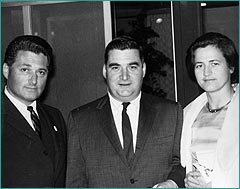Eichler Salesman Jonas Harschel - Page 2
"I called out to Mr. Eichler, determined to get an appointment this time or blow my chances forever," said Harschel. "'I just don't understand,' I blurted, 'how a man like you can build such a magnificent business like this and do nothing to conserve it!' "What gall! I didn't even know if Joe had any life insurance. But it worked. Mr. Eichler threw me a funny look, then growled with a smile as he walked on, 'Make an appointment with my son, Ned.'"
That chance meeting eventually led Harschel to his largest commission ever in the insurance field, but more importantly planted the seed for a new career working alongside people that embraced his social and political values and beliefs.
"I began to talk with Ned, and became involved in a delightful political conversation," Harschel recalled. "Contrary to the stifling reactionaries in the life insurance business, these people supported some of the most progressive social policies and displayed more courage, more integrity, and a deeper social conscience than any business I had ever known.
"While it was common practice in the real estate industry to suddenly go deaf, dumb, and blind when a 'Negro' walked into a broker's office—and all properties were mysteriously 'just rented,' 'just sold,' or 'why not try us next time?'—Eichler Homes had a publicly stated fair housing policy.
"Imagine, here were liberal businessmen bucking American industry's racist policies, and insisting on selling good design at fair prices 'because it was the right thing to do'!"
For the two years that preceded his timely meeting with the Eichler Homes executives, Harschel had become acquainted with many Eichler homeowners, having targeted them as prospective clients for insurance sales. He was drawn to them by shared values and life styles, and felt comfortable being in their company.
"The quality of people that lived in Eichler homes 35 years ago was quite different from the quality of people that lived elsewhere," said Harschel. "They were more progressive in their thinking and their politics. They were more liberal, more informed, more artistic. A very different crowd in those days. I really liked that."
Despite all that, Harschel didn't take the final leap away from the insurance business until his moral beliefs were once again challenged, this time by the highly controversial and publicized California capital punishment case involving Caryl Chessman, who had robbed and sexually molested two women. Chessman's May 2, 1960 execution in the electric chair marked the state's first use of the death penalty for a non-capital crime.
"I was aghast!" exclaimed Harschel, still shaken, even after 36 years. "Like Nazis and their gas chambers, the state-appointed killers had taken no chances. He had not murdered anyone. If his sentence were reduced to life imprisonment without parole, he could have served society by making us understand and remedy the causes of crime."
Harschel's conservative insurance colleagues used Chessman's death as an opportunity to drive home their political differences.
"One guy told me, 'Hey, Jonas, we finally cooked the bastard, didn't we?' I was floored. Was I to spend the rest of my life with those sanctimonious creeps in the 'life business' who professed to care so deeply about people and their futures? I stepped into my private office, closed the door—and called Ned Eichler."
A week later, Jonas Harschel had become a free man, so to speak, selling a new product he could believe in for a company he could trust—Eichler Homes. For the next four years, Harschel worked in San Mateo (the Highlands), Terra Linda, Burlingame, Castro Valley, and San Francisco (Diamond Heights), developing a reputation as a 'troubleshooter' for the sales staff.
"I gladly took the challenge," Harschel remarked. "When I saw that good houses were not selling, and they were breaking the company, then I would use my imagination and sell them.
"I had a duty to my employer, and to my buyers, because I believed in this product. My job was to make all the owners a part of a good subdivision. If you've got terrific houses in a subdivision that, for some reason, doesn't sell well, the houses lose value. That's a responsibility I took upon myself."
Today, in retirement, Jonas and wife Cora reside in Burlingame—in an Eichler home, of course—where Jonas is putting the final touches on a 27-year book project documenting his life experiences, "Six Billion Perfect Gods—All Seeking Something Higher."
![]()

As staunch Democrats and, in the early 1960s, prominent John F. Kennedy supporters, the Eichler organization knew how to make noise in political circles. Above, in 1963, Jonas and wife Cora share a moment—yes, that's an Eichler home behind them—with Pierre Salinger (center), President Kennedy's press secretary, during an Eichler fundraiser that backed the president's anticipated bid for re-election.




